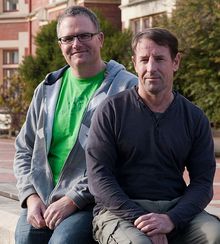The sedentary ‘couch potato’ lifestyle that many modern humans lead is often cited as a major cause of the current obesity epidemic – but an evolutionary biologist and a sports and exercise scientist think looking back on the lifestyle of our ancestors might cast a different light on the subject.
In an recent paper, published in Perspectives and Public Health, Lincoln University researchers Mike Hamlin (below, right) and Adrian Paterson (below, left) have looked at studies of activity in present-day hunter-gatherer societies, and compared that to the activity and energy expenditure of people living in developed countries.
‘It turns out that total daily energy expenditure between modern humans and hunter-gatherers is not significantly different,’ says Adrian Paterson. ‘Patterns of daily energy expenditure are different, in that our ancestors alternated days of high energy expenditure with lots of days just sitting around. Modern energy expenditure is a lot more even between days, without the extreme peaks and troughs.’
 Exercise expert Mike Hamlin argues that this lends support to the idea ‘that there is a connection with some of the latest research on the health benefits of high intensity training.’ Mike Hamlin has conducted research into the benefits of short intense benefits of activity, as compared to the usual recommendation for 30 minutes of moderate intensity exercise each day, and found that it offers similar health benefits.
Exercise expert Mike Hamlin argues that this lends support to the idea ‘that there is a connection with some of the latest research on the health benefits of high intensity training.’ Mike Hamlin has conducted research into the benefits of short intense benefits of activity, as compared to the usual recommendation for 30 minutes of moderate intensity exercise each day, and found that it offers similar health benefits.
The researchers go further, says Alison Ballance, suggesting that sedentary behaviour has some benefits. In hunter-gatherer societies with erratic access to food it would have been a way of conserving energy, as well allowing an opportunity for socialising, bonding and information sharing.
‘As hunter-gatherer societies didn’t have access to the same level of calories as we do today’ Mike Hamlin says this analysis lends support to the idea that food – both type and amount – is a significant contributor to today’s growing rates of obesity.
So our ancestors may have spent as much time as us being couch potatoes – but they weren’t eating chips and burgers while they did it.

